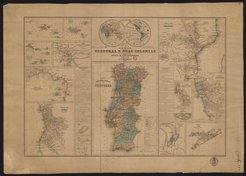Colonial projects: The question of labour in Portuguese Africa, 1880-1930
PhD Project
This research explores free labour policies instituted in Africa by the Portuguese State between 1850 and 1930, from the first legal measures enacted for the abolition of slavery to the promulgation of the Colonial Act. During the post-emancipation period, Portuguese Africa, whose territories corresponded to parts of current Angola, Cape Verde, Guinea-Bissau, Mozambique and São Tomé and Príncipe, experienced the proliferation of labour arrangements in which legally free individuals were submitted to compulsory work.
It should be stressed that the large-scale use of forced labour and continuing attempts to transform overseas populations into labour workers according to the mould of European political economy ideas were not a specificity of Portuguese colonialism. However, what is intended to be analysed in this project are the specificities of the strategies employed to carry this out. In this regard, I maintain that legislation was key in producing the legality of the colonial policy. Gradually, the areas under Portuguese domain started to enjoy a legal pluralism that was not previously anticipated by the legal order, and the colonies began to have specific work-related laws based on the claim that Portugal respected 'the habits and customs' of African indigenous peoples. Nevertheless, this process demonstrates how legislation resulted from dynamic processes in which subjugated populations also attempted to demonstrate, to a certain degree, what they considered to be loathsome or acceptable. The theme of legal pluralism in the administration of free labour during colonialism presents an interpretative framework that differs from classical analyses of the history of law, as it exposes how colonial and metropolitan laws were permeated by customary rights, interpretations of legality and resistances that do not communicate with the notion of an European law being indiscriminately applied overseas.

Biblioteca Nacional de Portugal / Biblioteca Nacional Digital. CASTELO BRANCO, Hugo Goodair de Lacerda, 1836-1930. Carta de Portugal e suas colonias / Coordenada por Hugo G. de Lacerda, official de cavallaria
Even considering that the legislation regarding African labour occupied the centre of Portuguese colonial projects, it should also be considered that colonial projects and policies were never unambiguous, always resulting from complex and dissonant processes. Legislators such as the Marquis of Sá da Bandeira insisted, for several years, on free labour policies that much resembled those applied to Portuguese settlers, comprehending even the possibility of Africans reaching full citizenship, as well as not applying compulsory labour on a large scale. Others, such as Albano de Magalhães, continued to promote the notion that African workers should remain in an arrangement that was halfway between slave and free labour (similar to the apprenticeship system adopted in the British Caribbean) and the idea that all sentences imposed in the civil and criminal spheres should be converted into labour, either in public or private enterprises. It can be said that, during the 19th and 20th centuries, colonial policies concerning Africans were toughened, expanding the possibility for someone to be considered a vagrant, increasing the sanctions imposed on this criminal classification, establishing and increasing taxes and subjecting entire populations to mandatory labour.
This research also aims at understanding, from a global historical perspective, the connections of free labour as devised by Portugal, since, as recent historiography demonstrates, there are several limitations in analysing slavery and post-emancipation strictly from national perspectives, that is, circumscribed within the abstraction of nation-state territorial limits, so it would be incomplete to carry on this analysis without considering both sides of the Atlantic. The emancipation process in Portuguese Africa both influenced and was influenced by freedom policies elsewhere, but these relations have still been scarcely explored. Countless times, Portuguese legislators mentioned proceedings relative to the end of slavery in other contexts in order to replicate procedures or to repel possible similar situations. The empire administrators proved to be avid researchers of what they named 'the question of labour' in slaveholding societies. In various essays or in Portuguese parliamentary debates there were mentions, for example, to the conditions of slaves in Brazil, Cuba, Puerto Rico and the United States, or to the emancipation of the African colonies held by Great Britain, France, the Netherlands and Germany. Portuguese Africa is part of the slaveholding Atlantic not only through the provision of slaves, but also through discussions about the slave trade, slavery and post-emancipation.
